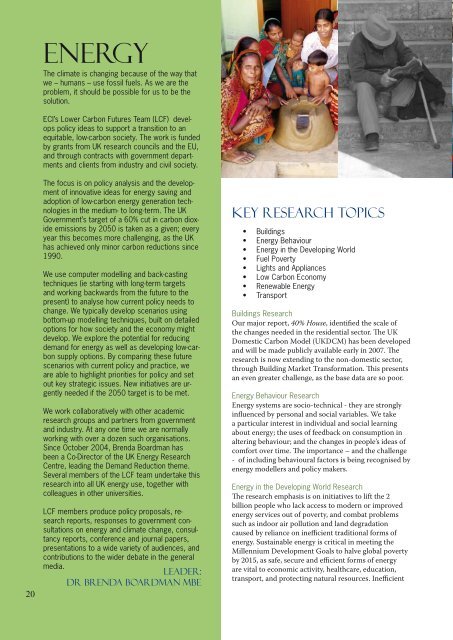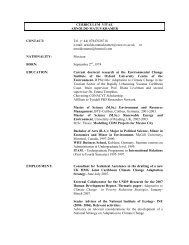ECI Annual Review 2006/2007 - Environmental Change Institute ...
ECI Annual Review 2006/2007 - Environmental Change Institute ...
ECI Annual Review 2006/2007 - Environmental Change Institute ...
You also want an ePaper? Increase the reach of your titles
YUMPU automatically turns print PDFs into web optimized ePapers that Google loves.
0<br />
Energy<br />
The climate is changing because of the way that<br />
we – humans – use fossil fuels. As we are the<br />
problem, it should be possible for us to be the<br />
solution.<br />
<strong>ECI</strong>’s Lower Carbon Futures Team (LCF) develops<br />
policy ideas to support a transition to an<br />
equitable, low-carbon society. The work is funded<br />
by grants from UK research councils and the EU,<br />
and through contracts with government departments<br />
and clients from industry and civil society.<br />
The focus is on policy analysis and the development<br />
of innovative ideas for energy saving and<br />
adoption of low-carbon energy generation technologies<br />
in the medium- to long-term. The UK<br />
Government’s target of a 60% cut in carbon dioxide<br />
emissions by 2050 is taken as a given; every<br />
year this becomes more challenging, as the UK<br />
has achieved only minor carbon reductions since<br />
1990.<br />
We use computer modelling and back-casting<br />
techniques (ie starting with long-term targets<br />
and working backwards from the future to the<br />
present) to analyse how current policy needs to<br />
change. We typically develop scenarios using<br />
bottom-up modelling techniques, built on detailed<br />
options for how society and the economy might<br />
develop. We explore the potential for reducing<br />
demand for energy as well as developing low-carbon<br />
supply options. By comparing these future<br />
scenarios with current policy and practice, we<br />
are able to highlight priorities for policy and set<br />
out key strategic issues. New initiatives are urgently<br />
needed if the 2050 target is to be met.<br />
We work collaboratively with other academic<br />
research groups and partners from government<br />
and industry. At any one time we are normally<br />
working with over a dozen such organisations.<br />
Since October 2004, Brenda Boardman has<br />
been a Co-Director of the UK Energy Research<br />
Centre, leading the Demand Reduction theme.<br />
Several members of the LCF team undertake this<br />
research into all UK energy use, together with<br />
colleagues in other universities.<br />
LCF members produce policy proposals, research<br />
reports, responses to government consultations<br />
on energy and climate change, consultancy<br />
reports, conference and journal papers,<br />
presentations to a wide variety of audiences, and<br />
contributions to the wider debate in the general<br />
media.<br />
Leader:<br />
Dr Brenda Boardman MBE<br />
Key Research Topics<br />
•<br />
•<br />
•<br />
•<br />
•<br />
•<br />
•<br />
•<br />
Buildings<br />
Energy Behaviour<br />
Energy in the Developing World<br />
Fuel Poverty<br />
Lights and Appliances<br />
Low Carbon Economy<br />
Renewable Energy<br />
Transport<br />
Buildings Research<br />
Our major report, 40% House, identified the scale of<br />
the changes needed in the residential sector. The UK<br />
Domestic Carbon Model (UKDCM) has been developed<br />
and will be made publicly available early in <strong>2007</strong>. The<br />
research is now extending to the non-domestic sector,<br />
through Building Market Transformation. This presents<br />
an even greater challenge, as the base data are so poor.<br />
Energy Behaviour Research<br />
Energy systems are socio-technical - they are strongly<br />
influenced by personal and social variables. We take<br />
a particular interest in individual and social learning<br />
about energy; the uses of feedback on consumption in<br />
altering behaviour; and the changes in people’s ideas of<br />
comfort over time. The importance – and the challenge<br />
- of including behavioural factors is being recognised by<br />
energy modellers and policy makers.<br />
Energy in the Developing World Research<br />
The research emphasis is on initiatives to lift the 2<br />
billion people who lack access to modern or improved<br />
energy services out of poverty, and combat problems<br />
such as indoor air pollution and land degradation<br />
caused by reliance on inefficient traditional forms of<br />
energy. Sustainable energy is critical in meeting the<br />
Millennium Development Goals to halve global poverty<br />
by 2015, as safe, secure and efficient forms of energy<br />
are vital to economic activity, healthcare, education,<br />
transport, and protecting natural resources. Inefficient






